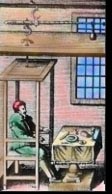|
Claude Bernard (1813-1878)
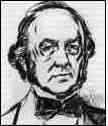 Bernard, generally acclaimed as the greatest physiologist of
all time, succeeded François Magendie as Professor of Medicine at the Collège
de France. Bernard interned in medicine and surgery before serving as
laboratory assistant (préparateur) to Magendie in 1839.
Three years later, he followed Magendie to the Hôtel-Dieu hospital
in Paris. For the next 35 years, Bernard discovered fundamental properties
about physiology. He participated in the explosion of scientific knowledge
in the mid century. Following Darwin's The Origin of Species
(1859), Louis Pasteur (1822-1895) refuted spontaneous generation between
1860 and 1865 and stimulated the growth of microbiology. In 1865, Gregor
Mendel (1822-1884) promulgated the laws of heredity. Artists too experimented
with technique (Corbet, Courbet, Degas, Daumier, Manet, Millet, Monet,
Renoir, and Rodin). Philosophers (de Tocqueville, Comte, Bergson, Proudhon)
and writers (Balzac, Baudelaire, Dumas, Hugo, Flaubert, Maupassant,
Stendhal) boldly explored new frontiers. Radical individualism that
fostered science and art also encouraged social turmoil: coups, two
revolutions (1848, 1870), and two wars against Austria and Prussia.
Reflecting on this unrest, Marx and Engels drafted the Communist
Manifesto in Paris 1848. Bernard, generally acclaimed as the greatest physiologist of
all time, succeeded François Magendie as Professor of Medicine at the Collège
de France. Bernard interned in medicine and surgery before serving as
laboratory assistant (préparateur) to Magendie in 1839.
Three years later, he followed Magendie to the Hôtel-Dieu hospital
in Paris. For the next 35 years, Bernard discovered fundamental properties
about physiology. He participated in the explosion of scientific knowledge
in the mid century. Following Darwin's The Origin of Species
(1859), Louis Pasteur (1822-1895) refuted spontaneous generation between
1860 and 1865 and stimulated the growth of microbiology. In 1865, Gregor
Mendel (1822-1884) promulgated the laws of heredity. Artists too experimented
with technique (Corbet, Courbet, Degas, Daumier, Manet, Millet, Monet,
Renoir, and Rodin). Philosophers (de Tocqueville, Comte, Bergson, Proudhon)
and writers (Balzac, Baudelaire, Dumas, Hugo, Flaubert, Maupassant,
Stendhal) boldly explored new frontiers. Radical individualism that
fostered science and art also encouraged social turmoil: coups, two
revolutions (1848, 1870), and two wars against Austria and Prussia.
Reflecting on this unrest, Marx and Engels drafted the Communist
Manifesto in Paris 1848.
Bernard remained oblivious to all except his "physico-chemical science."
Mayer (1951) writes about Bernard's approach to science:
Bernard combined with a capacity for hard and prolonged work in the
laboratory his appreciation of the importance of leisure spent in
quiet meditation. His adherence to exact truth was absolute, and he
was always ready to recognize the limitations or the error of what
had seemed like a promising idea until tested in the laboratory. His
technical skill was superb, both as an experimental surgeon and as
a biochemist. Yet essential as these characteristics were, they are
not sufficient to explain his unequaled series of fertile discoveries.
Bernard, first of all, believed strongly in the necessity of always
having a working hypothesis, derived from perusal of the literature
and observation of natural phenomena, before starting on the experiment
proper. He used to say: "He who does not know what he is looking for
will not lay hold of what he has found when he gets it."
But imagination is not equivalent to genius unless it is joined to
what was perhaps Bernard's outstanding characteristic, the ability
to devise the single, definitive crucial experiment which will test
a far-reaching hypothesis. Bernard, like a great general who maps
and executes a campaign by striking at the vital points of the enemy
hosts, and takes only those positions which have to be taken to bring
decisive victory, never wasted any time on experiments which were
not essential to his progress. And, of course, his skill allowed him
to perform these experiments in a minimum of time and with a maximum
of precision.
Bernard had an extraordinary capacity for extracting from his results
the most general and far-reaching conclusions that could be solidly
supported by them; hence, his role as a progenitor in so many branches
of the biological sciences.
| Claude Bernard surrounded by
his pupils during one of his many experiments. The original
is in the Department of Physiology, School of Medicine, Paris.
Drawing by L'Hermitte. |
| 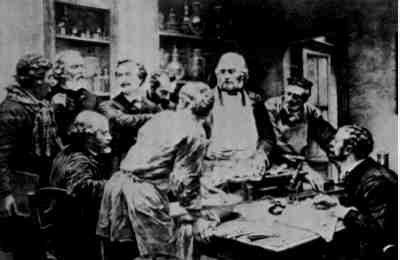
|
| Surgical instruments
used by Bernard in his studies of electrical stimulation of
tissues and the effects of the drug curare, a topic of extreme
interest to him since his early school days. |
| 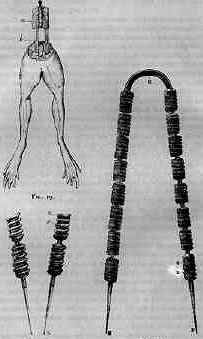
|
| Scientific apparatus used by
Bernard in his classic experiments of blood flow in the brain
|
| 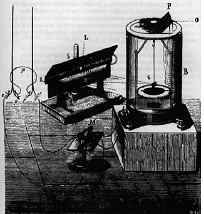
|
Bernard indicated his single-minded devotion to research by producing
an M.D. thesis (1843) on gastric juice and its role in nutrition (Du
sac gastrique et de son rôle dans la nutrition). Ten years
later, he received the Doctorate in Natural Sciences for his study entitled
Recherches sur une nouvelle fonction du foie, consideré comme
organe producteur de matière sucrée chez l'homme et les
animaux (Research on a new function of the liver as a producer of
sugar in man and animals). Prior to his seminal research, scientists
assumed that only plants could synthesize sugar, and sugar within animals
must be derived from ingested plant matter. Bernard disproved this notion
by documenting the presence of sugar in the hepatic vein of a dog whose
diet lacked carbohydrate.
Bernard's experiments changed medicine (Fruton, 1979):
- The discovery of the role of the pancreatic secretion in the digestion
of fats (1848).
- The discovery of a new function of the liver--the "internal secretion"
of glucose into the blood (1848).
- The induction of diabetes by puncture of the floor of the fourth
ventricle (1849).
- The discovery of the elevation of local skin temperature upon section
of the cervical sympathetic nerve (1851).
- The production of sugar by washed excised liver (1855) and the isolation
of glycogen (1857).
- The demonstration that curare specifically blocks motor nerve endings
(1856).
- The demonstration that carbon monoxide blocks the respiration of
erythrocytes (1857).
| 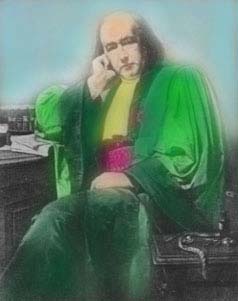
|
| Claude Bernard after
winning a prestigIous award for his many scientific accomplishments.
|
Bernard's work also influenced other sciences. His discoveries in chemical
physiology spawned physiological chemistry and biochemistry, which in
turn created molecular biology. His contributions to regulatory physiology
helped the next generation understand how metabolism and nutrition affected
exercise.
Despite the importance of Bernard's discoveries, the French government
barely supported scientific research. Germany, Russia, and England provided
laboratories in universities and hospitals. Bernard's predecessors,
Magendie and Bert, worked in small rooms, poorly lit and inadequately
ventilated (Guerlac, 1977). Bernard spoke out against his government's
neglect of science. Still, he continued to experiment.
Bernard's influential Introduction à l'étude de la
médecine expérimentale (The Introduction to the Study
of Experimental Medicine, 1865)4 illustrates the self control that enabled
him to succeed despite external perturbations. It requires researchers
to vigorously observe, hypothesize, and test their hypothesis. In the
last third of the book, Bernard shares his strategies for verifying
results. His disciplined approach remains valid, and should be required
reading for all scientists, regardless of the field.
Bernard's life inspired appreciative works by the Cambridge physiologist
Sir Michael Foster (1899) and historian Grmek (1971). A few days after
his death, Bernard's friend and colleague Paul Bert wrote the following
poignant eulogy (see preface of Bernard, 1927):
Nothing in his pure and harmonious life was turned aside from its
chief aim. Enamored of literature, art and philosophy, Claude Bernard
as a physiologist lost nothing by these noble passions; on the contrary,
they all helped in developing the science with which he identified
himself, and of which he is the highest and most complete embodiment.
He as a physiologist such as no man had been before him. "Claude Bernard,"
said a foreign scientist, "is not merely a physiologist, he is physiology."
His very death seems to mark a new era in science. For the first
time in our country, a man of science will receive those public honors
hitherto reserved for political and military celebrities.... And one
phrase... sums up all that we have said: "The light, which has just
been extinguished, cannot be replaced."
References
Bernard, C. (1927).The introduction to the study of experimental
medicine (translated by H. C. Greene). Henry Schuman, New York.
Foster, M. (1899). Claude Bernard. Longmans Green, New York.
Fruton, J. S. (1979). Claude Bernard the scientist. In E. D. Robin
(Ed.) Claude Bernard and the internal environment. A memorial symposium.
Marcel Dekker, New York.
Grmek, M. D. (1971). Claude Bernard. In Dictionary of scientific
biography. Charles Scribner's Sons, New York.
Guerlac, H. G. (1977). Essays and papers in the history of modern
science. Johns Hopkins University Press, Baltimore.
Mayer, J. (1951). Claude Bernard. Journal of Nutrition, 45,
3.
© Frank I. Katch,
William D. McArdle, Victor L. Katch. 1997.
Copyright ©1997
|
